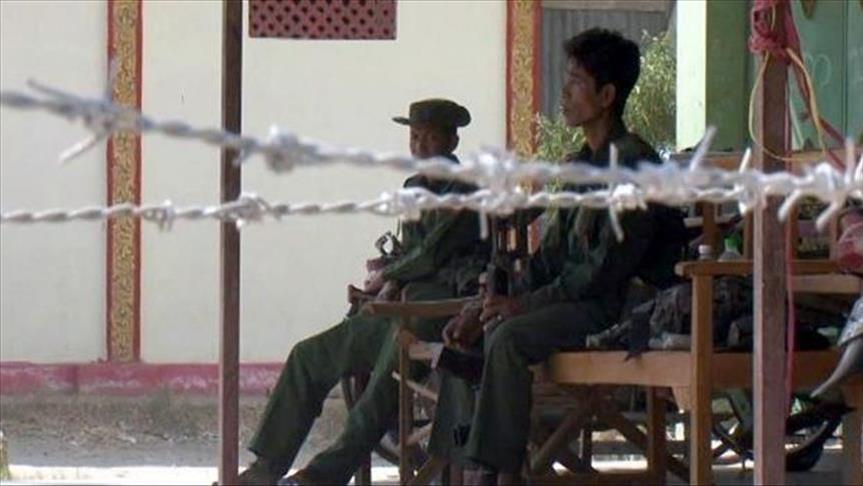Civilians dead in fighting in northeast Myanmar
Army, ethnic rebel group trade blame over shelling that killed 2 civilians, including a boy, amid fighting in Shan State

By Kyaw Ye Lynn
YANGON, Myanmar
Myanmar's military and an ethnic rebel group traded blame Friday over heavy shelling that killed two civilians in an area near the country’s northeastern border with China.
The Office of Commander-In-Chief of the armed forces said the Ta’ang National Liberation Army (TNLA) fired heavy weapons at a military outpost in Nam Hsan Township of Shan State on Thursday, but four stray shells landed in Ho
“Two residents were killed and eight villagers including three women injured because of the strayed weapon shells,” it said in a statement Friday.
The fatalities included a 7-year-old boy who the statement said was injured while playing outside of his house and died on the way to
Government offices,
The rebel group, however, said the shells were fired by the Myanmar army as the ethnic people of the region gathered to celebrate Ta’ang Revolution Day on Jan. 12.
TNLA spokesperson Ta Aik Kyaw told Anadolu Agency that the group attacked the army bases in retaliation for recent assaults on their outposts in the area.
“They [the military] don’t know where we
“The army, they accuse
The TNLA, the powerful Kachin Independent Army, the Myanmar National Democratic Alliance Army and the Arakan Army -- known as the Northern Alliance -- had jointly attacked police stations, military outposts and a trade zone in Shan’s Muse Township in November.
Fighting between government troops and the KIA also intensified in northern Kachin State over the past few days after four rebel outposts were taken over by soldiers Jan. 9.
According to a report by Voice of America published Thursday, around 4,000 displaced persons had attempted to flee across the border to China after mortar shells hit two temporary camps -- only to be turned away by Chinese authorities.
Several rebel groups, including those in the Northern Alliance, had refused to sign the Nationwide Ceasefire Agreement (NCA), a peace deal between Myanmar’s previous quasi-civilian government and eight rebels groups in October 2015.
State Counselor Aung San Suu Kyi -- the de facto leader of the country’s first civilian government in over 50 years -- has been calling on rebel groups to join an ongoing peace process by signing the NCA as her administration prepares to hold a second meeting with armed ethnic groups later this month.
Since winning the November 2015 election, Suu Kyi has made peace and national reconciliation a priority for the administration led by her National League for Democracy (NLD) party.
Myanmar, however, still witnesses some of the fiercest fighting
On Friday, New York-based Human Right Watch (HRW) said Suu Kyi’s administration has failed to hold the military accountable for persistent human rights violations throughout the country.
In its World Report, HRW said Myanmar’s new civilian government has done little to address the military’s brutal crackdown on ethnic Rohingya Muslims in western Rakhine State and other abuses against civilians in ethnic
“Aung San Suu Kyi and her new government brought high hopes that Burma [Myanmar] had finally turned the corner toward becoming a rights-respecting democracy,” said the group’s Asia director, Brad Adams.
“But to reach that goal, the government needs to stand up for principles of human rights, and that means holding the military accountable,” he said.
Government forces have been regularly identified as responsible for violations -- including extrajudicial killings, torture, sexual violence and destruction of property -- in ethnic areas.
Fighting between the army and ethnic rebel groups has worsened in ethnic areas over the year since the NLD-government took over in March 2016, according to HRW.
The rights group underlined that the country’s constitution, which was drafted by a former junta in 2008 and granted the military control of three key ministries and 25 percent of seats in parliament, has facilitated continued human rights abuses and stymied meaningful political reform.
Anadolu Agency website contains only a portion of the news stories offered to subscribers in the AA News Broadcasting System (HAS), and in summarized form. Please contact us for subscription options.







